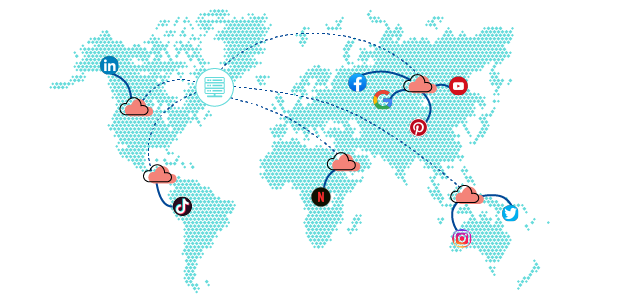CDN Is A Must For Your Website And Here Is Why

People are impatient and that can be easily seen when you’re driving around a busy metropolis like New York. On every road, traffic light, and even on the sidewalks, people will not hesitate to smash their horns , just to save a few seconds. In most big cities in the US, God forbid you haven't dashed off from the stop line after the signal turns yellow. A tirade of swears, horns, and other unpleasant screams will splash over you like a Tsunami.
And while you could attribute this behavior to a few neurotic drivers, people, in general, are impatient. Our attention span is worse than that of a goldfish., to put it mildly. It only takes seconds to see how they react when a website doesn't open in less than 3 seconds.

A 2018 study by Google shows that if your website loads slower than 3 seconds, you will lose 32% of your visitors. Make them wait for just two more seconds, and 90% of them will lose interest. So by the 6th second of waiting on your page, there will be just a small number of enthusiasts left.
There are many tricks to increase the load speed of your website. However, sometimes, it all comes down to the physical distance between the user and the server. At this point, you can either move your servers overseas and hire people to manage them there or, use a CDN, which is a far simpler solution.
What Is A CDN?
Although it sounds like a lucrative drug from the '60s, CDN is much more helpful, less harmful, and it's definitely not illegal (at least in the civilized world). A CDN or Content Delivery Network is a group of servers spread around the globe to provide the fastest possible delivery of any Internet content. They practically eliminate the load time delay of a website due to the server's geographical location.

The first CDNs appeared in the late '90s and amazingly are still at work. About 15-30% of all the internet traffic goes through these fossils of early internet technology.
Today's content-driven websites like Youtube, TikTok, Facebook, Netflix, Instagram, and countless others would be impossible without CDNs. These networks allow the lightspeed transfer of files from the server to the user's browser, thus enabling the websites to provide videos, images, games, and even live videos. Anyone who had the misfortune of opening an image stored on a server across the ocean in the '90s would instantly understand the massive progress that CDNs provided.
How Does A CDN Work?
CDNs are much like the town's gossips, who are always first to know. Their channels will spread a rumor faster than Usain Bolt. Unlike the babblers, though, CDNs are much more reliable. They take the information directly from the original server, cache and deliver it faster, cheaper, more dependable, and secure. To achieve this, the CDN provider will place servers at Internet Exchange Points (IXP).
IXPs are places where different internet providers exchange information. For the Internet to be what it is, all internet providers should give access to content that originates from their network. Thus IXPs are fundamental for the Internet's existence in its current form. By placing servers in all IXPs, CDN providers guarantee fast access to any content, no matter where it hails from.
As a comparison, if a US-based user wants to get content from an Iranian-based server, they would have to face several problems. Firstly, the NSA will break down their door and beat them senseless until they find out they've got the wrong guy. Secondly, the sheer geographical distance between the two countries will increase the data transfer time. Yes, the whole process will take literally 4-5 seconds, but as we discussed in the intro, this, for some reason, is highly unacceptable by today's standards.

Using a CDN won't help with the NSA part, but it will significantly reduce the data transfer time. Practically the web browser will receive the package from a local server, where the data was cached beforehand.
Knowing this, a logical question arises:
Can A CDN Replace A Web Host?
Having a CDN and a web host for your website might sound a bit redundant, but actually, it's not. A web host provides you with a specific amount of space on a server, where all the HTML, CSS, Javascript, images, videos, and any other information that constructs your website is allocated. For your website to come to life, a browser acquires the IP address of this server and takes the needed data for it to show on the user's screen.
DNS will show you the whole process of getting your website on the user's screen.
A CDN only takes this information from the server and caches it on locally distributed servers, allowing the process of opening your website to be shortened.
Indeed, some CDN providers also offer web host services, but that doesn't mean that your website is stored on the CDN system.
So, can't you just go with a standard website hosting and forget about all that CDN mumbo-jumbo? Unfortunately, it's not a good idea. A CDN is quite handy in a variety of ways.
Why Do You Need A CDN?
CDNs carry a lot of benefits with them. Of course, they depend on the size and need of the user. However, most often, people use them for the four main advantages they bring.
Decreased Loading Time
The most important benefit, which we have already mentioned several times, is the exponentially improved website loading time. As already explained, CDNs eliminate the delay time caused by the physical distance between the user and the server. As stated in the 2018 Google study, the faster connection to the website will reduce the bounce rates, increase the time spent on the website, and enhance the trustworthiness of your pages. In terms, this will lead to a bigger audience, more purchases, and a better user experience as a whole.

Saves Money
Using a CDN will also directly reduce your spendings. The Bandwidth consumption cost is one of the highest websites owners pay. By caching the data on the CDN servers around the world, the number of transfers from the original server will plummet. This may lead to a cheaper hosting service since the visits to the actual server will be limited severely.
CDNs won't allow your website to crash due to high traffic. No matter how powerful the hardware of a server is, it has a limit of how many processes it can do per minute. For example, if there are ten requests for your website's data in one minute, your server will do just fine. IF there are 100, it will start to feel a bit overwhelmed. If there are 1000 requests in one minute, the server will likely crash, and your website will be down. CDN distributes all the requests among their network of services, thus none of the servers are particularly overwhelmed. This improves content availability and allows a higher number of simultaneous visitors.
Last but definitely not least,
Additional Security
The Internet is a beautiful but dangerous place. Every time a user tries to open a website, a series of data is transferred between the user's computer and the website's server. Unfortunately, this data transfer is vulnerable to interceptions by digital pirates, who wish to steal data or alter the existing ones with some kind of malware that will benefit them. Unfortunately, these pirates are not wearing eyepatches and don't have wisecracking parrots for humor relief. There is nothing funny about getting your computer or your data hacked.
Fortunately, this is prevented by several protocols that encrypt and later decrypt the data once it reaches its destination. TSL and SSL are precisely these kinds of protocols, and all CDN providers install them to ensure the security of your data. This makes the CDNs not just convenient but also more secure for your website and, more importantly, for your users.
Furthermore, since the CDN servers are placed right on the IXPs, it also provides your website with additional protection against malicious attacks. The position allows CDN to block all DDoS floods by allocating the traffic to a different server according to the request's origin. This way, even if one server is overwhelmed, the traffic will be distributed to others, and your website will remain active.
CDNs also block abusive bots and crawlers and won't allow them to ravish through your server's resources and bandwidth.
Static And Dynamic Acceleration
Knowing how the CDN works and how it stores data, one might wonder, won't there be a problem with dynamic content?
When it comes to static content, the process is pretty straightforward. The CDN caches all media files, HTML, CSS, JavaScript and delivers them to the end-user without the need of generating, processing, and modifying them at a moment's notice.
This is also applicable for dynamic content that isn't changed all that often. For example, if you have a static professional website, where you list your offers and once a month you post in your blog, and once a quarter you adjust your prices, the CDN will cache your changes. You can even purge the old cache on your own to accelerate the process. It takes a few seconds to do it.
However, dynamic websites like news pages, magazines, video channels, and others change their appearance several times per day and sometimes even per hour. It would have been quite the bother to purge the existing cache 50-100 times a day. So in these cases, CDNs use advanced routing algorithms that keep your server calm and unbothered but don't rely strictly on cache. The result is practically the same.
Who Should Use A CDN?
In all fairness, if you frequently browse around the net and you use Facebook, Instagram, Youtube, Netflix, you already use CDNs every day. You are just on the receiving end of it. As an end-user, you should always look for websites with CDNs, as they provide a better user experience, higher-quality protection, and faster delivery.
On the other end, CDN should always be used by website owners, no matter if they have e-commerce, media, entertainment, or portfolios websites. Due to the benefits mentioned above, owners will enjoy zero downtime, much lower bounce rates, better conversion rates, higher customer loyalty, and increased ad impressions. In addition, improved web security will make your website more trustworthy.
CDNs are also a must for Network Service Providers. NSPs usually find it easier to deploy their own CDN, as online streaming and the user's high expectation don't allow them to neglect the fast pace of the digital world. Almost every digital service nowadays needs a stable and fast connection to function correctly.
For an NSP, there isn't a more terrifying nightmare than angry customers, ready to spread the word of the poor service. With a CDN, all subscribers will reduce the traffic load and will improve the user experience. It's also a great way to reduce the burden on the core network.
Conclusion
Content Delivery Networks are not just a valuable tool for website owners. In today's fast-paced world, where users are as patient as a child on Christmas morning, having CDN is a must.
With its ability to reduce load speed by diverting requests from the central server to additional servers located closer to the end-user, CDNs increase user experience immensely.
- A cost-efficient, easy, safe, and convenient method of delivering your content.
- Thus increasing your conversion rates.
- Customer loyalty.
- Website trustworthiness.
CDNs are also a great ally against malicious actions of third parties who seek to destroy your success and steal your and your audience's data. CDN's effectively deal with DDoS attacks, block bots and crawlers and provide TLS/SSL certificates for your domain.
Having doubts about adding something new to your website is absolutely understandable, especially if you don't understand it completely.
However, if you’re looking for a trustworthy team to help you mount the best CDN and enjoy the benefits of it without the headaches of actually doing your website in a CDN, then schedule a free consultation with us to find out how we can help!






